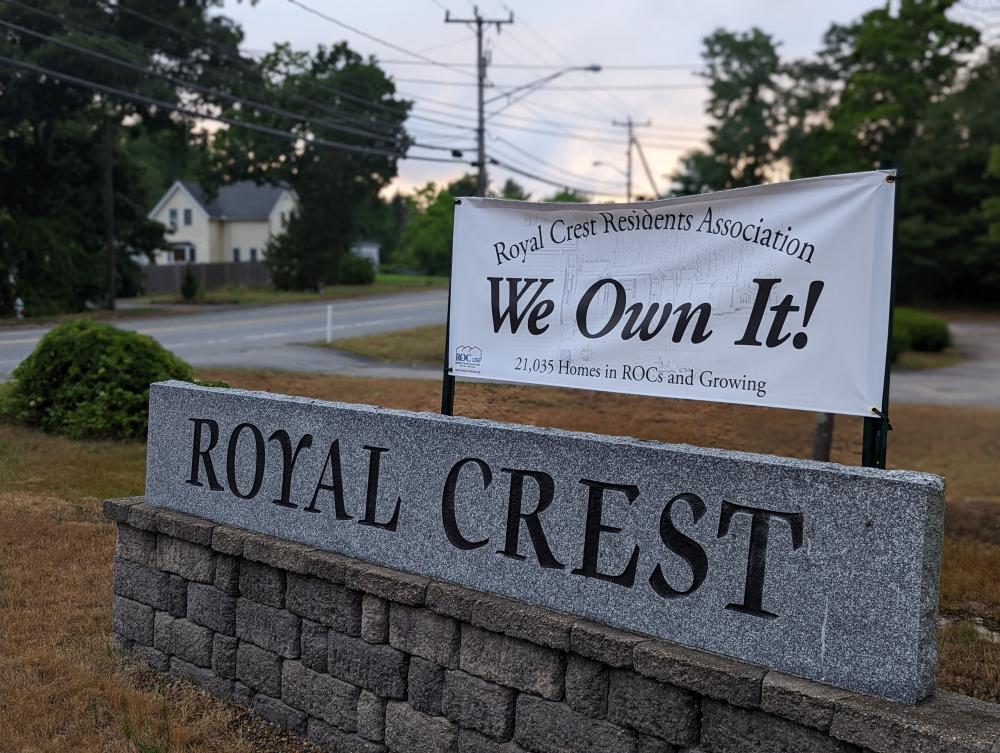A first in the state: Royal Crest residents navigates state funding rules
As the first manufactured home community in Massachusetts to ever receive funding from the state’s housing department for affordable housing — to the tune of $1.9 million — Royal Crest residents still have a lot of work to do.
There’s two big goals in mind: Residents and the town hope to get the park counted as affordable housing for the benefits that come with that. For the Cooperative Development Institute, the nonprofit that’s been helping Royal Crest over past months, the aim is to fulfill award requirements to nail down that nearly $2 million in state funding and keep the park affordable for residents.
Residents of the mobile home park, which comprises about 150 homes for people 55 years old and older, bought their neighborhood after the park received an unsolicited bid in February. In mobile home parks, residents may own their homes, but they pay rent for the land their homes sit on.
Arizona-based Legacy Communities offered $12 million for the land, and it already owns three other mobile home parks in Wareham. Because of Massachusetts’ right-of-first-refusal law, residents had a chance to find the funding to buy the park themselves — which they did in late July. They came up with the $12 million with help from Resident-Owned Communities USA and the state’s affordable housing trust.
After the residents’ association signed the paperwork finalizing the residents’ purchase of the land beneath their mobile homes, talks began on how to meet the state’s award requirements and fit the community into the state’s definition of restricted affordable housing.
Being counted among Wareham’s official affordable housing stock comes with benefits: adding to the town’s Subsidized Housing Inventory, which gives the town more power over incoming Chapter 40B affordable housing development, and being able to receive funds from the local affordable housing trust for things like rental assistance.
But the road to get there is literally uncharted territory.
“It's totally new frontier,” said Nora Gosselin, a market development and acquisitions specialist for the nonprofit Cooperative Development Institute, which has been helping Royal Crest residents for months.
This is the first time the state has doled out affordable housing trust funds for this kind of purchase. Now Royal Crest residents, and their partners from CDI, are in talks with the state to determine what the resident-owned community needs to do to meet the requirements of the state award.
One key issue at hand is that by law, mobile homes are not considered “real estate,” but “personal property” like cars or RVs in the eyes of the state. Residents don’t own the land under their homes, and even in resident-owned communities, the association collectively owns the lots under everyone’s homes.
“In order to restrict the affordability, it has to be real estate,” said Laura Shufelt, director of community assistance at Mass Housing Partnerships.
Other requirements include the land being income-restricted and having a “fair and open market” for housing units, Shufelt added.
Shufelt isn’t involved with the Royal Crest project, but she sat in on a Wareham Affordable Housing Trust meeting last week when Gosselin and park resident Bob Costa came before the trust to talk through the issue.
The real estate vs. personal property issue is not a new one: State Rep. Susan Gifford has lobbied for years to get mobile homes counted as affordable housing under state law.
“The issue of ownership of the actual land under the mobile/manufactured homes was a big concern for the folks at the Department of Housing & Community Development and a big part of their reluctance to make considerations for mobile homes,” Gifford said in an email. “However, that was not the only concern they had.
“That is why I filed a bill to establish a commission to look into the definition of affordable housing as it relates to Chapter 40B. We need to determine what it would take for DHCD to make changes in the definition to allow a community to count all or some of their mobile & manufactured homes as affordable housing units.”
Gifford said there have been other resident-owned communities in the state for years which haven’t had any bearing on changing the state’s definition of affordable housing.
“Therefore, I believe it will take a lot more ‘convincing’ than just the residents of Royal Crest buying their park,” she said.
Park resident Costa said in an interview that the residents association withdrew its request for funding from the town’s affordable housing trust after it got a boost from the state. For now, what residents want to see from the town’s trust is some kind of rental assistance, as even after becoming a resident-owned community, Royal Crest’s rent may be arduous for some, Costa said.
“We hope that the town will be able to do something,” Costa said.
The Wareham Affordable Housing Trust has been supportive of the Royal Crest, writing a letter to local representatives and the DHCD in support of the residents buying their own land.
Wareham Affordable Housing Trust Chair Carl Schulz said though the town’s trust doesn’t have many tools right now, the group is working to improve its infrastructure so there’s a better process for renters to apply for help in the future.
For Royal Crest and its partners at CDI though, they’ve already achieved a major step in keeping residents’ homes lowercase-a affordable: becoming a resident-owned community.
“Ultimately, our aim is affordability,” Gosselin said.













